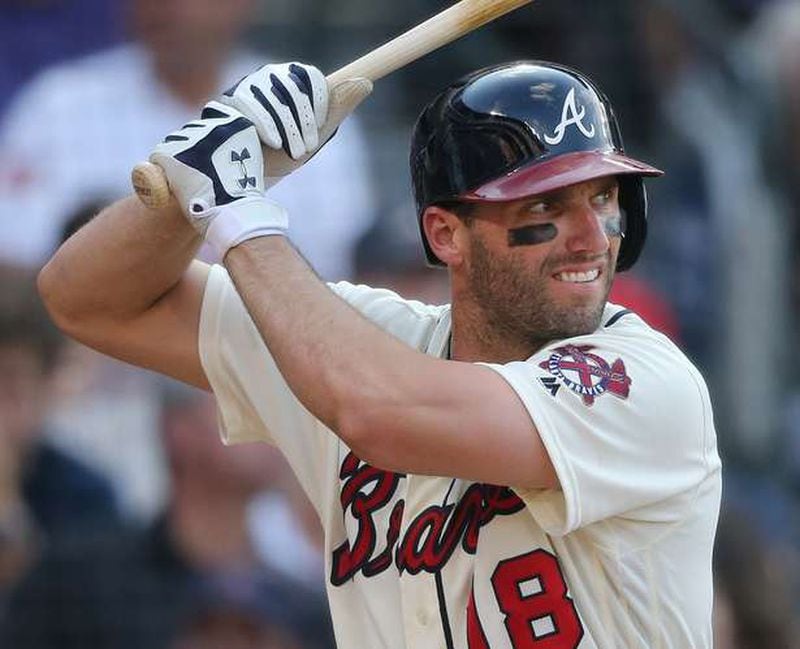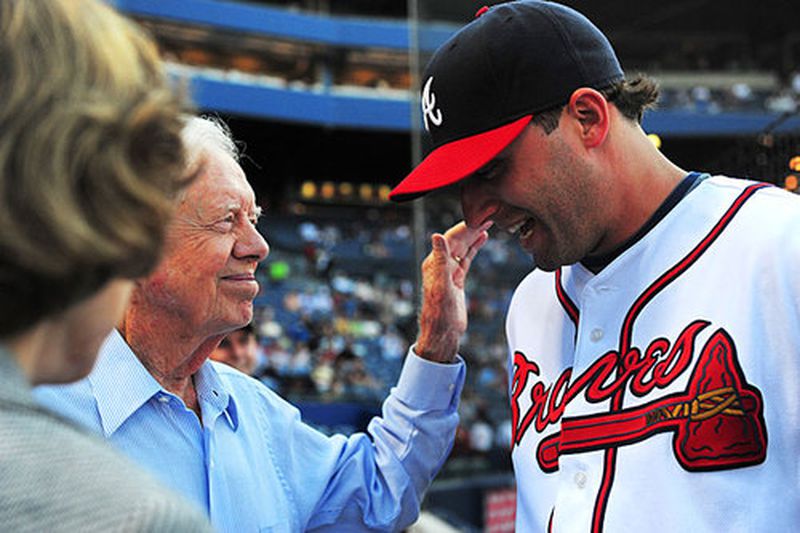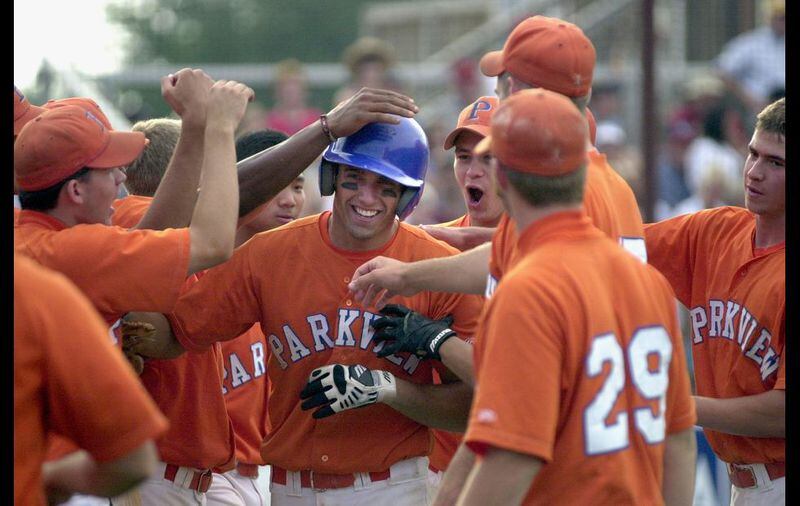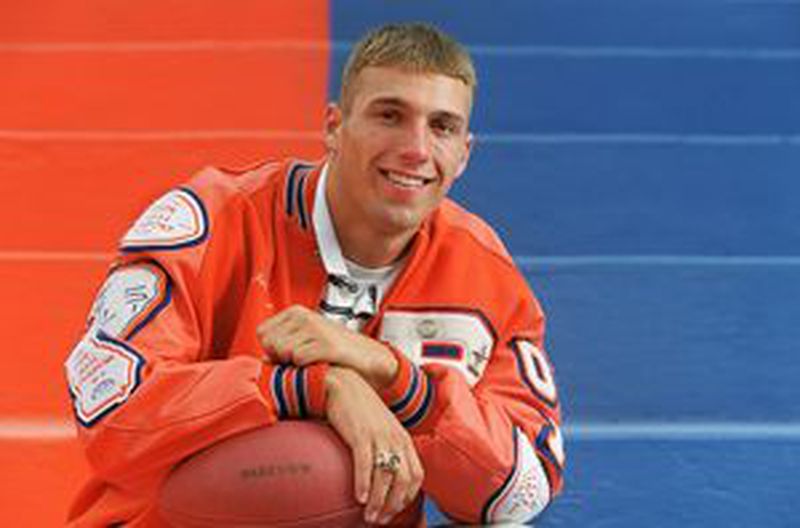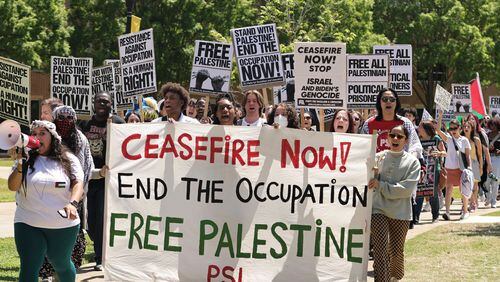DENVER -- Braves outfielder Jeff Francoeur, 32, has been a part of Atlanta's collective sports consciousness for nearly half of his life, since emerging as a two-sport phenom at Parkview High School. He led Parkview to consecutive state football and baseball championships, was a Georgia high school player of the year and prep All-American in both sports, and committed to a football scholarship at Clemson before opting to sign with the Braves as a first-round selection in the 2002 draft.
Three years later, Francoeur was on the cover of Sports Illustrated under the headline “The Natural,” so impressive was he as a rookie phenom in 2005. In his first full season in 2006, he had 29 homers and 103 RBIs. But the magic of his early career subsided, his statistics declined, his relationship with a key front-office official deteriorated, and he was traded in 2009.
Seven years and six major league teams – not to mention nearly one full season (2014) at Triple-A El Paso – after leaving the Braves, Francoeur re-turned in February, signing a minor league contract at the beginning of spring training and earning a spot on the opening-day roster as a bench/platoon player with a modest $1 million salary. The Braves like the production -- .288 average and .781 OPS vs. left-handers -- and leadership they've gotten from Francoeur, one of Atlanta's most popular players with fans and teammates alike, and a guy who’s learned a whole lot along the way about how to handle success and failure, and to fully appreciate his station in life.
I talked with him Sunday morning before the Braves’ series finale at Colorado, where they were swept in four games to drop their majors-worst record to 33-66.
Is it easier for a 12-year veteran who’s bounced around some and spent a season in the minors a couple years ago to deal with being on a team that’s struggling, or is that perspective outweighed at all by a desire to play in the postseason again while you’re still able to?
I believe that I’m going to be where I’m supposed to be, and if that’s here to finish up the year, and here next year to help these guys win, then I’m looking forward to it. And if it’s to go somewhere else and have a chance to go to the postseason and maybe sign back (with the Braves next season), I think I’m onboard with that, too. But I think coming home to Atlanta has changed me a lot and kind of come full circle, where I would love the postseason, but at the same time to play at home and to close out Turner Field is something that I think would be a lot of fun.
For those who wonder what it’s like to be part of a team trying to avoid losing 100 games, as opposed to playing for a contending team with World Series ambitions, is there a big difference on a daily basis? Or even on an hourly basis?
Yeah. I think when you come to the field every day when you’re battling for a postseason roster, you’ve just automatically got energy. And when you’re not, there can be tough days. And that’s why I think it’s even more important that you have guys on the team who can say, ‘Hey, let’s go,’ kick you in the butt. To some of the young guys say, hey, let’s keep going, you’ve got to suck it up. It’s tough because you don’t have the energy of a pennant race when you know you’re going to be playing in front of 40,000.
I think sometimes – in fact I know, because I hear it and get it Tweeted to me – that some fans believe they (fans) are hurting more watching the team lose, that they somehow have more invested it in, than do the actual players, since they see players still enjoying themselves or they watch a postgame interview and hear a player say we’ll go get ‘em next time. Can you explain why it’s important that at least the majority of players in a clubhouse maintain a positive outlook and not act as if they’re crushed after every difficult loss?
Well, I think if you look at it, even the best teams in baseball, for the most part, lose about 65, 70 games a year. And that’s a lot. You have to have realistic expectations, and I think in this game especially…. My dad always told me when I came up, and I’ve tried to hold onto this, that you’re never as bad as you think you are or as good as you think you are. And I think the same thing can be said as a team. So when you are struggling, it’s easy to throw stuff. It’s easy to get pissed and come in here (upset). But at the end of the day what good is that going to do? If people were around here every day, they would see guys snapping in the dugout, they’d see guys after the game who are really hurting. It’s just that eventually you have to kind of let that go to be able to succeed the next day. I don’t think the average fan understands that. I think you (reporters) can explain it a little just because for the most part you’re on the road with us all year, you see how hard it is, you see the day-to-day. It’s unlike any other sport (because you play so many games). That’s what people don’t understand.
What’s the best part of playing in the majors for you at this point, besides the money?
(Laughs). Honestly, I just love this game, I love competing. I love the daily grind. I love the idea that I can suck last night like I did (Saturday) and hopefully I get a chance to drive in some runs and help win a ballgame today. That's why this game keeps you going. Otherwise, I would have quit after 8 ½ years, if it was about the money and this and that. I think anybody who knows me knows I just love to play the game, and I love being on a team, and I love being part of this team. I'm always going to be invested in Atlanta, just the city in general. And I want to be part of the solution for however long it's going to be -- whether it's playing, coaching, front office – that gets this organization back to where we know we can be.
Does any part of you still feel like you're playing a game, getting paid well to play a little boy's game? And do you think most players have a similar view in that regard?
I don’t think everybody does. I really don’t. I hate to say it, I think some people look at it as a job, some people look at it as checking in and out. But I think that’s one thing that I’ve always tried to do. You have your days where it feels like a job, no doubt. But at the same time, after two, three, four days, if you don’t have one of those days where it feels like you’re going to the park to play a game and have fun…. My dad always said, ‘I put on a suit and tie on for 34 years. You put a suit and tie on to go on a plane. You don’t have to go through security and baggage claim.’ So, you have your days; I tell you right now, (Saturday) night I was just mad -- we blew it, I didn’t do anything to help the team get close -- but at the same time, I’m coming back today and you’ve got to be jacked up to play.
What’s been the most enjoyable part of this season for you?
Honestly, the most enjoyable part has been my little girl, my kids, can see me play in Atlanta. And that I’ve gotten to see so many people come back – (Rafael) Furcal, (Ryan) Klesko, all these people who are here because it’s the last year of Turner Field. Get to see Murph (Dale Murphy) more. And just talking to a lot of these people. And of course, the chance to play for Snit (Bryan Snitker). Me and Snit go back a long ways, and it’s kind of come full circle that I’m back and he’s managing. Just what a joy that’s been.
And what’s been the most difficult part?
The losing. It takes its toll on you. I mean, I think most people know – and you know – I’m a very positive person. But you have your days where you wake up and think, man, this is going to be a long day. Or, I can’t believe we’re stuck in this little run. I think you have to find a way to get around that. But that’s been the most difficult part, because I hate to lose. Last year I was part of a Philly team that was really rebuilding, and now this year -- it’s two years with a lot of losing. That’s not easy, coming in every day.
Are you glad you re-signed with your hometown team, your original team? And has there been more or less pressure or scrutiny on you than you thought there might be in this second stint with the Braves?
I have thoroughly enjoyed my time, and I’m glad I did (come back). We looked at three or four other teams – Colorado was one of them – and the idea that I went back home, living in my own house, playing there is great. The scrutiny, it comes with the job. But I think if anybody knows me, how different that I am now than I was 10 years ago – it doesn’t bother me. I know my strengths and I know my weaknesses. I’m not one to sit here and try to defend my weaknesses, or say that I should be doing this or that. I know what I do well and what I help this team with, and I’m confident with that. To me, as long as the guys know that and the front office and coaches feel that way, then I’m comfortable with that.
What’s the toughest part of playing major league baseball at 32?
Your body. The difference. And I know 32 can be young, but people forget, too, I’ve played every day since I was 21. Played hard, banged up the body and stuff. And I think it’s more just getting yourself ready, day in and day out. Like today (Sunday), 2 o’clock game. Two hours before a game you’re going to be doing routines, stretches, to get yourself ready. Whereas, when I was 22 I could hop out of bed and hack at the first pitch and be good. Now you’ve got to really make a conscious effort to make sure you’re ready, day in and day out.
What’s the best part of playing major league baseball at 32?
That I’m still playing. I’ve got a lot of buddies who are starting to do other stuff. I don’t take it lightly that I’m still able to play this game at the big-league level after 10 years, and you’re just really humbled by it.
How much golf do you play on the road these days? More or less than you did when you broke in with Smoltz on the team?
Can you get on most of the finest courses in America, like Smoltz, Maddux and Glavine did?
(laughs) I can because of those guys. Because I call them up and they send me numbers of contacts they have. It’s kind of a yes and no – yes, but not because of me. Because of them.
OK, I’ve always wanted to ask you this: Have you ever regretted not going to play football at Clemson rather than signing for that fat bonus with the Braves?
Not a day in my life. Because if I did do the football who knows where I would’ve ended up? And I definitely wouldn’t be playing baseball right now. So for me, it was a no-brainer to do what I did. The only thing I miss is I would’ve loved to know what it felt like to run down the hill one time at Clemson with 90,000 there.
Do you think you could’ve been a standout player in college football after being the Georgia high school Player of the Year at Parkview?
Yeah, I think I could have been a really good college football player. I don’t think the next level would have been the same; who knows, maybe I would have been a Steve Tasker tight end stud. But I think I would have been a solid college football player.
As you get older, do you think most rookies and other kids on the team know you were something of a two-sport legend at Parkview High? (He interrupts question: "No.") Do you occasionally like to tell them, if they don't know?
Oh, I let them know, for sure. But, I mean, I’m not going to throw anybody under the bus but there’s two or three guys on our team who didn’t even know who Terry Pendleton was. (Chuckles.) You talk to them, you’re like, is your head out of the phone every once in a while? Know some history of baseball. No, but I let the guys know about the football part.
Speaking of your football prowess: Don’t take this the wrong way, but for a guy who’s not exactly a burner on the base paths, how did you produce the terrific stats you did as a high school receiver and defensive back – 14 touchdowns and 15 interceptions in 15 games as a senior – in a state that is loaded with great prep players including tons of speedy skill-position players? I mean, it’s not as if you were a football stud in North Dakota. You played in Georgia. A football hotbed. In the largest classification.
“I was very, very fast in high school, I really was. I played fast, put it that way. I knew when I had to run and go get the ball, and I was a smart football player, I always knew where to be both offensively and defensively, and that helped. (He laughs, adds sarcastically, “I appreciate the not-a-burner part.”)
Be honest: Do you have better all-around athletic skills than Smoltzy?
No. I wish I did, but no.
How long do you plan to keep playing? Because I know what my response to that would be: As long as I possibly can.
I think somewhat like that. At the same time, I’ve put a lot work it and at this point, with kids and all, I take it year by year. And I know I definitely want to play next year, if I have the opportunity, whether it’s here of somewhere else. But then after that, you never know. You never know how your body’s going to feel. You never know what happens in this game. But I do know I don’t want to play until I’m 38, 39, 40. I’ve got other things and kids. I want to be there. I want to do other stuff. I think anybody who knows me knows I have a lot of other interests besides baseball, and I think eventually traveling gets to you. You know? And especially with the family, it’s tough. And I don’t want to miss that.
About the Author
